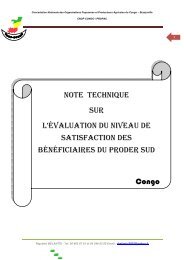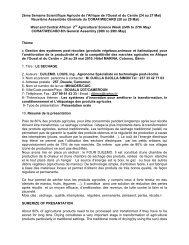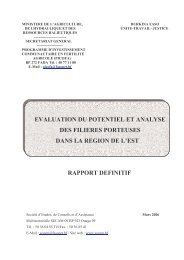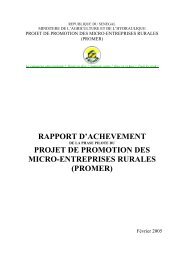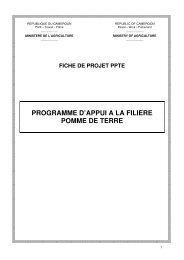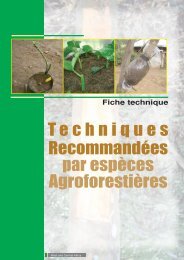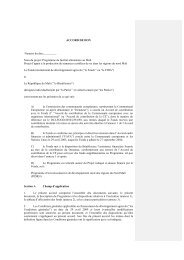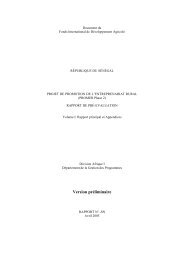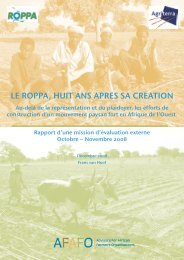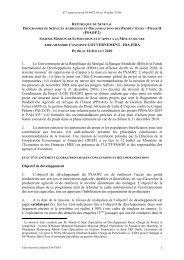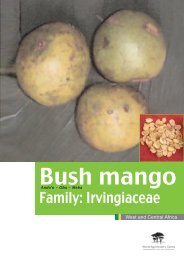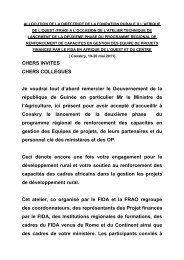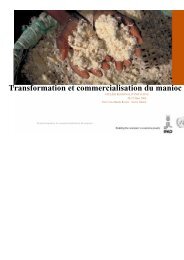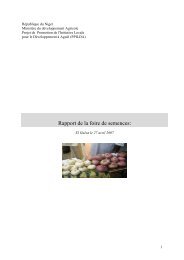Scaling Up the Fight Against Rural Poverty - FIDAfrique
Scaling Up the Fight Against Rural Poverty - FIDAfrique
Scaling Up the Fight Against Rural Poverty - FIDAfrique
You also want an ePaper? Increase the reach of your titles
YUMPU automatically turns print PDFs into web optimized ePapers that Google loves.
Moreover, IFAD has had some success stories in developing effective scaled up value chain programs<br />
and has recently much intensified its attention to this issue. However, <strong>the</strong> effectiveness of its<br />
engagement in this area remains to be fully tested. A systematic assessment has yet to be made how<br />
IFAD can best use <strong>the</strong> value chain approach to pursue an effective scaling up approach for rural<br />
livelihood development.<br />
D. Corporate evaluation of innovation and scaling up in IFAD’s programs<br />
In April 2010 IFAD’s Independent Office of Evaluation presented to <strong>the</strong> Evaluation Committee of <strong>the</strong><br />
IFAD Executive Board <strong>the</strong> findings of EIS, its major evaluation of innovation and scaling up at<br />
IFAD. 22 This evaluation was principally focused on innovation, but also explored IFAD’s operational<br />
approach to scaling up.<br />
The evaluation is based on a broad range of information inputs, including an assessment of IFAD’s<br />
strategic directions; of <strong>the</strong> evaluation results of <strong>the</strong> completed project portfolio; of <strong>the</strong> approach in<br />
recent country strategies and ongoing projects; and of <strong>the</strong> results of a survey of IFAD’s operational<br />
staff.<br />
The evaluation concludes that <strong>the</strong> importance of scaling up has been stressed for some time in IFAD’s<br />
strategic documents, and it cites specific cases of successful scaling up in country programs. But it also<br />
concludes that scaling up has generally not been effectively built into country programs. “While <strong>the</strong>re<br />
are some examples of successful scaling up, <strong>the</strong> resources allocated for <strong>the</strong> purposes are insufficient<br />
and staff skills are not adequate for <strong>the</strong> purpose. <strong>Up</strong> scaling has largely occurred in an informal and<br />
unsystematic manner largely due to individual initiatives.” 23 The evaluation concludes that IFAD<br />
needs to “[t]reat scaling up as mission-critical”. 24<br />
E. Conclusions<br />
The main findings of this chapter are fourfold:<br />
IFAD has good examples of scaling up in its country and <strong>the</strong>matic programs.<br />
IFAD’s successful scaling up experiences can provide helpful insights and lessons into how to<br />
design appropriate scaling up pathways and should be systematically assessed as part of a<br />
future scaling up knowledge management initiative.<br />
In general, however, scaling up has not been a systematic focus of IFAD’s country and<br />
<strong>the</strong>matic programs.<br />
IFAD would benefit from a more systematic approach to scaling up. The remainder of this<br />
review explores various aspects of how this could be done.<br />
22 IFAD Independent Office of Evaluation (2010).<br />
23 Ibid., Executive Summary, p. 26.<br />
24 Ibid., Executive Summary, para. 125.<br />
26



